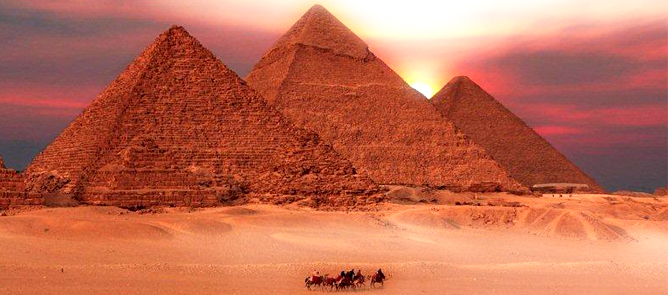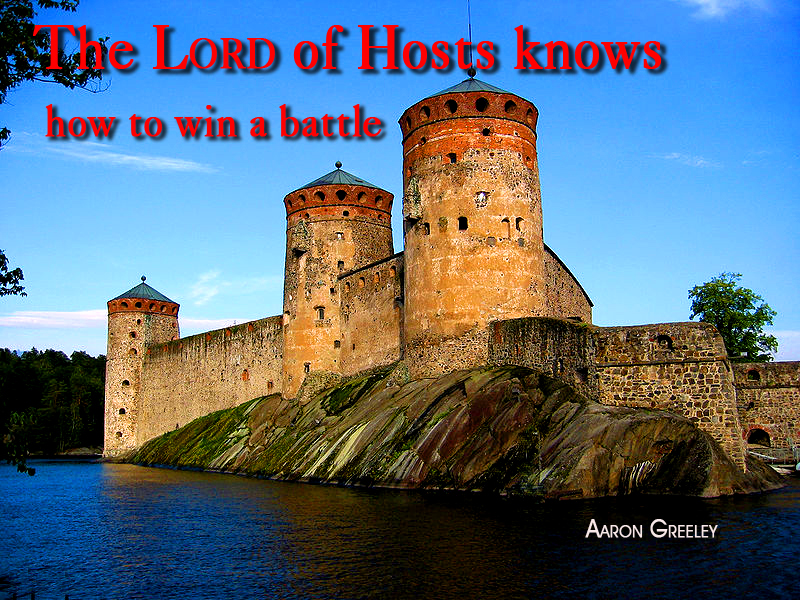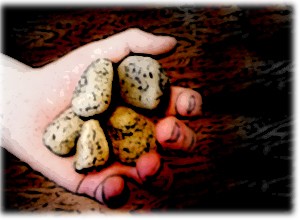The LORD of hosts is his name—
There is no king saved by the multitude of an host;
a mighty man is not delivered by much strength —Psalm 33:15
THE LORD OF HOSTS is one of the most common names used for God in the Bible (more than 260 times). The name in Hebrew is YHWH Sabaoth. YHWY is the holy personal name of God, meaning self-existent. Sabaoth is the term for hosts, meaning a great number, usually applied to the angelic armies of heaven.
The Lord of hosts knows how to win a battle. His victories often come when the odds are stacked against the people of God.
Consider the battle of David and Goliath. With the Philistine giant shouting insults and challenging the God of Israel, the soldiers of Israel are frightened. But the shepherd boy is full of courage and faith—
Then David said to the Philistine, “You come to me with a sword and with a spear and with a javelin, but I come to you in the name of the LORD of hosts, the God of the armies of Israel, whom you have defied.
This day the LORD will deliver you into my hand, and I will strike you down and cut off your head. And I will give the dead bodies of the host of the Philistines this day to the birds of the air and to the wild beasts of the earth, that all the earth may know that there is a God in Israel, and that all this assembly may know that the LORD saves not with sword and spear. For the battle is the LORD’s, and he will give you into our hand.”
—1 Samuel 17:45-47
David is proved a hero and the Israelites are emboldened. The Philistines flee and are routed.
Remember the salvation of the LORD of hosts at the Red Sea. Egypt, the greatest army in the world, reigned down on the fledgling nation of Israel. With no weapons or military, Israel is left wondering, “Why is this happening to us?” Moses reassures them—
And Moses said to the people, “Fear not, stand firm, and see the salvation of the LORD, which he will work for you today. For the Egyptians whom you see today, you shall never see again. The LORD will fight for you, and you have only to be silent.” —Exodus 14:13-14
Miraculously, the waters are split and Israel crosses on dry ground. The once mighty army of Egypt tries to follow and is drowned entirely.

The LORD of hosts doesn’t need a large army to win his battles. Consider Gideon’s army of 32,000 men marching to face the Midianite army.
The LORD said to Gideon, “The people with you are too many for me to give the Midianites into their hand, lest Israel boast over me, saying, ‘My own hand has saved me.’ —Judges 7:2
Eventually the LORD uses only 300 men to defeat Midian. The Midianites never again raised their head against Israel (Judges 8:28).
[clearcol]
;
| The Lord needs no army |
THE LORD of hosts needs no army of men to accomplish his will. Recall how the Assyrian army approached Jerusalem after previously conquering the tribe of Israel. The tribe of Judah was next. Sennecherib, the king of Assyria, boasted of his great victories, laying waste to many nations. Hezekiah encourages the nation to remain calm and he prays that the LORD will remember his people.
“Be strong and courageous. Do not be afraid or dismayed before the king of Assyria and all the horde that is with him, for there are more with us than with him. With him is an arm of flesh, but with us is the LORD our God, to help us and to fight our battles.” And the people took confidence from the words of Hezekiah king of Judah. —2 Chronicles 32:7, 8
In the record of this battle in 2 Kings 19 the LORD himself speaks to the Assyrian king—
Because you have raged against me and your complacency has come into my ears, I will put my hook in your nose and my bit in your mouth, and I will turn you back on the way by which you came.… “Therefore thus says the LORD concerning the king of Assyria: He shall not come into this city or shoot an arrow there, or come before it with a shield or cast up a siege mound against it. By the way that he came, by the same he shall return, and he shall not come into this city, declares the LORD. For I will defend this city to save it, for my own sake and for the sake of my servant David.” And that night the angel of the LORD went out and struck down 185,000 in the camp of the Assyrians. And when people arose early in the morning, behold, these were all dead bodies. —2 Kings 19: 28-35
185,000 soldiers dead instantly! That is a sweeping victory.
We get a glimpse of the LORD of hosts’ army when the Syrian army surrounded Dothan in order to capture Elisha, the man of God. Elisha’s servant is frightened until Elisha prays for his servant to have vision.
So he sent there horses and chariots and a great army, and they came by night and surrounded the city. When the servant of the man of God rose early in the morning and went out, behold, an army with horses and chariots was all around the city. And the servant said, “Alas, my master! What shall we do?” He said, “Do not be afraid, for those who are with us are more than those who are with them.” Then Elisha prayed and said, “O LORD, please open his eyes that he may see.” So the LORD opened the eyes of the young man, and he saw, and behold, the mountain was full of horses and chariots of fire all around Elisha. —2 Kings 6: 14-17
What a sight it must have been! Ironically, the Syrian army was blinded and eventually sent packing.
[clearcol]
| God as commander |
THE NAME LORD of hosts pictures God as commander of a great army of angels for which nothing is impossible. Angels, hoses and chariots of fire do battle against the dark forces of this world, overwhelming them.
Who is this King of glory? The LORD of hosts, he is the King of glory! Selah —Psalm 24:10
O LORD of hosts, God of Israel, enthroned above the cherubim, you are the God, you alone, of all the kingdoms of the earth; you have made heaven and earth. —Isaiah 37:16
For thus the LORD said to me, “As a lion or a young lion growls over his prey, and when a band of shepherds is called out against him he is not terrified by their shouting or daunted at their noise, so the LORD of hosts will come down to fight on Mount Zion and on its hill. Like birds hovering, so the LORD of hosts will protect Jerusalem; he will protect and deliver it; he will spare and rescue it.” —Isaiah 31: 4-5
I wonder if Peter was thinking of this prophecy when he drew his sword in the garden on the mount of olives when Jesus was betrayed. A band of brutes dared approach the Son of God with weapons in order to arrest him.
And behold, one of those who were with Jesus stretched out his hand and drew his sword and struck the servant of the high priest and cut off his ear. Then Jesus said to him, “Put your sword back into its place. For all who take the sword will perish by the sword. Do you think that I cannot appeal to my Father, and he will at once send me more than twelve legions of angels? But how then should the Scriptures be fulfilled, that it must be so?” —Matthew 26: 51-54
.
Do you realize what Jesus is saying? He confirmed that at his command are twelve legions of angels at the ready. He gives the order and the angels will be sent. That makes Jesus, the LORD of hosts!
The implication is that if the veil of darkness that shadows reality were lifted, as it was with Elisha’s servant, we would witness 72,000 angels, horses and chariots of fire surrounding the mount of olives ready to deliver Jesus at once.
So why did he hold them back? The LORD of hosts knows how to win a battle. But instead of calling down judgment and overwhelming his captors, he hold back the angels and goes quietly.
Not just quietly, willingly. He willingly denies himself the angels he has used so often before. Why?
Because he knows how to win the battle; the battle against sin. This battle could not be won with angelic strength, speed, weapons or fiery cavalry. This battle could only be won by the blood of Jesus Christ, the LORD of hosts.
In conclusion, please consider the first two verses of A Mighty Fortress, written by Martin Luther. You will recognize the name LORD Sabaoth and hopefully appreciate the meaning more completely.
A mighty fortress is our God, a bulwark never failing;
Our helper He, amid the flood of mortal ills prevailing:
For still our ancient foe doth seek to work us woe;
His craft and power are great, and, armed with cruel hate,
On earth is not his equal.
Did we in our own strength confide, our striving would be losing;
Were not the right Man on our side, the Man of God’s own choosing:
Dost ask who that may be? Christ Jesus, it is He;
Lord Sabaoth, His Name, from age to age the same,
And He must win the battle.
Thanks be to God; the LORD of hosts knows how to win a battle!
—Aaron Greeley
[clearcol]


